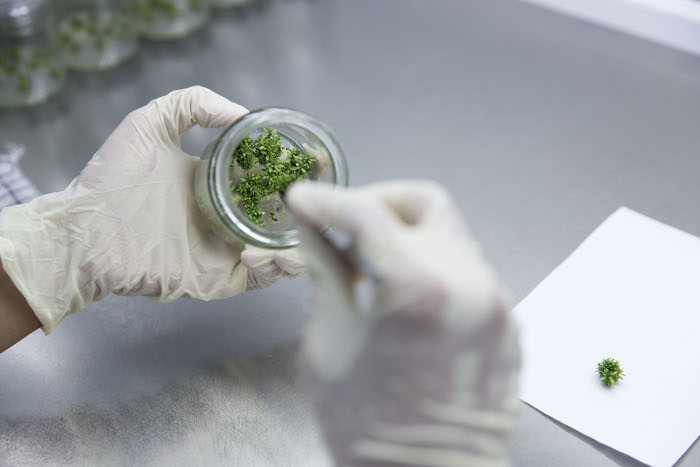Research & Development
APRIL invests in research and development (R&D) to advance sustainable approaches to forestry plantation management. The company operates a centralized facility comprising three laboratories and located at its Pangkalan Kerinci complex. This facility is responsible for forestry research and central nursery management across APRIL’s fiber business unit.

R&D Focus Areas
The R&D Center’s core focus is on improving fiber productivity in order to support more efficient and sustainable production. The Center nurtures seedlings that provide higher pulp yield and better pulping properties, consume less energy, and are more resilient to the threat posed by pests and disease.
This is line with the company’s to the continued adoption of best management practices for its operations on soil and peatland. APRIL continues to invest in research on soil management to find the right characteristics that enable optimum seedling survival across various field conditions in plantations on the company’s own concessions and among suppliers. This includes micro planning to reduce soil compaction and erosion.
APRIL does not use any genetically modified organisms (GMOs) in any of its research programs and initiatives, or in any areas where research takes place under the company’s direct or indirect responsibility.
The R&D department comprises more than 200 people including specialists in forestry, agriculture, biometry and biological sciences.

Major Research Programs
In 2019, APRIL completed five major research programs, including:
- Tree improvement research focused on the continuous improvement of planting material to yield higher volume, including good stem form and better wood properties, lower energy consumption, wider genetic diversity and lower susceptibility to pest and diseases.
- Fiber technology research focused on fiber properties and the variations among genetic materials.
- Plantation management improvement research focused on cost competition, species clones for silvicultural practices, and factors affecting long term site sustainability and productivity.
- Soil science research that surveyed and mapped soil across all forestry business units and conducted an in-depth study on the relationship between edaphic factors with stand productivity and the efficient use of fertilizers.
- Plant health research focused on integrated pest and disease management with an emphasis on the development of biological control strategies and efficient use of chemical control.

Use of Technology
The R&D Center uses a range of technology tools and processes to capture results across its multiple research programs. These include the operational deployment of Near Infra-Red Reflectance Analysis (NIRA) and Resistograph technology, as well as controlled pollination to further improve certain tree traits, tissue culture to obtain a sufficient number of mother plants and clonal planting materials for vegetative propagation.
Technology is also applied to accelerate the selection of fiber characteristics for incorporation into genetic selection criteria for a breeding and deployment program.
Bio-molecular Lab
The R&D Center also has a bio-molecular lab that supports the selection of fast growing, good fiber properties and resistant genetic materials as part of the breeding and deployment program. The lab also identifies pest and diseases that affect nurseries and plantations.


